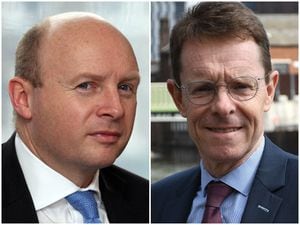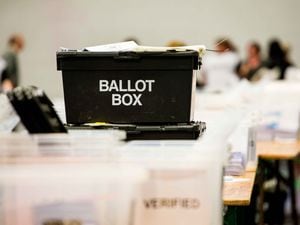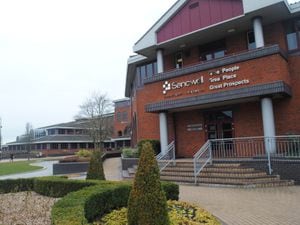West Midlands Mayor election 2021 preview: Can Andy Street win a second term?
The 2021 West Midlands Mayor election is expected to be a battle between Conservative Andy Street and Labour's Liam Byrne.

Race is on to run region's fight back from pandemic
In its short history of one election, the race to become West Midlands Mayor has served as a reliable indicator of the direction of local and national politics.
In 2017 the Tories were rank outsiders to win in the West Midlands, an area where Labour dominated four of the seven councils, including the biggest in Birmingham.
Yet Conservative Andy Street upset the odds and edged home by the tightest of margins, giving the Tories hope at a time when the party was bogged down in Brexit turmoil.
It had been Labour candidate Sion Simon's election to lose, and on the back of one of the most inept political campaigns in recent memory, he promptly lost it.
The result looked even more bizarre a month later, when Theresa May's decision to call a 'snap' general election backfired spectacularly as lost her majority and Labour gained 30 seats.
It proved to be a momentary blip for the Tories, however, who in the years to follow saw a surge in support culminating in Boris Johnson's thumping win in 2019.
It all means that for both major parties, the importance of winning the West Midlands mayoralty this week cannot be overstated.
For a Labour Party desperately attempting to fight back after the Corbyn years, victory for candidate Liam Byrne will signify a badly needed vote of confidence in Sir Keir Starmer, who has struggled to get his message across in his first year as leader.
It will also push back against the Tory surge in the region - placing a brick back in the red wall, if you will.
Defeat on the other hand would be catastrophic, giving credence to the view of those on the left of the party that Sir Keir's project is failing and that he is simply not the one to lead Labour into a brighter future.
As far as the Conservatives are concerned, a win for Mr Street – who is back to bid for a second term – keeps the blue bandwagon rolling, and also suggests voters are happy with his work during his first term.
Mr Street's problem is that he is defending his position on the back of a pandemic year, when much of his work on jobs and the economy has been undone.
His message is effectively: the region was heading in the right direction before Covid hit, give me the chance to drive us forward again.
Mr Byrne has seized on this, publishing a manifesto that paints a bleak picture of a region standing on the bring of economic collapse even before coronavirus.
Naturally the Labour candidate has all the solutions, and paints himself as a Mother Teresa-type figure who is going to sweep in and save the West Midlands from disaster.
If you're hungry, he'll feed you; if you're homeless, he'll house you. He's pledged to support women, children, students, veterans, pretty much everyone really.
He's also released a charter for nature, presumably detailing how he's going to save the birds too.
Whether any of this washes with the electorate of nearly two million people remains to be seen, although Mr Byrne's biggest problem may well be a crisis of identity.
His pitch during this campaign has been geared towards ministers having repeatedly let the West Midlands down, with him being cast as a people's champion ready to wrest wads of cash out of the clutches of the Treasury.
This may be easier to swallow if Mr Byrne was not a Westminster veteran of 17 years - the same guy who as a minister in Gordon Brown's government wrote the infamous austerity note, and who also laid the foundations for the Tories 'hostile environment' immigration policy.
In recent years he briefly jumped on the Corbyn bandwagon (his twitter header photo featured the then-Labour leader) before attempting to rebrand himself once again as Starmer's man.
His mayoral campaign has hardly gone smoothly.
He faces an allegation of misuse of public funds, and was mocked for distributing campaign leaflets riddled with spelling mistakes and grammatical errors.
A GoFundMe page set up for his campaign has raised less than one fifth of its £5,000 target. doing nothing to dispel rumours that he has run out of money.
While Mr Byrne is attempting to be all things to all men, Mr Street wants people to see that there's an authenticity about him - a quality many would argue is missing in a fair few career politicians.
He wants to be viewed as the wheeling and dealing former John Lewis boss, who despite having the ear of senior ministers, rarely bangs the Conservative Party drum.
Indeed, as with 2017, many of his campaign leaflets look decidedly un-Tory, and he has rarely resorted to political attacks during his four year tenure as Mayor.
Mr Street points to his record in office of bringing in £3.2 billion in investment, a figure which Mr Byrne insists has left the region short-changed.
As for predicting the likely victor, polls have placed Mr Street way ahead and the bookies agree, pricing the Tory at odds as short as 1/5.
Mr Byrne says he expects a comfortable victory, a view he appears to have based on him finding that "door-knocking has gone really well".
The one certainty is that with the pandemic hitting the West Midlands harder than most other parts of the country, whoever wins faces a monumental challenge to get things back on course.
Minority party candidates bidding to make their mark
The election for West Midlands Mayor is likely to be a two-horse race, but other parties are also having their say.
In 2017, the first time the region elected a Mayor, the Tories and Labour hoovered up nearly 83 per cent of the votes between them in an election which saw a turnout of just 26 per cent.
The Lib Dems were third on that occasion, and this year Ed Davey's party is represented by Jenny Wilkinson, a chartered accountant and business consultant who has previously stood for parliament in Sutton Coldfield.
Solihull councillor Steve Caudwell is the Green Party's candidate.
Reform UK, the rebranded Brexit Party, has put forward Pete Durnell, who stood as the Ukip candidate in the 2017 Mayoral election where he came fourth with 5.6 per cent of the vote.
On Thursday voting takes place in the four Black Country boroughs as well as Birmingham, Coventry and Solihull. The result will be declared on Saturday, with the winner set to serve a three year term.
Under the supplementary voting system, any candidate who gets more than 50 per cent of the vote wins. If no one reaches that mark in the first round, the top two candidates move forward and second preference votes are taken into account.
Manifesto pledges
Liam Byrne (Labour): "A new future at the heart of Britain"
- vaccinate everyone against Covid as quickly as possible
- launch green jobs fund to accelerate the move towards zero carbon emissions
- free weekend bus travel travel at the weekend for 16 to 18-year-olds
- develop a 'charter for nature' and plant one tree for every person in the region
- double apprenticeship numbers with free retraining for the unemployed
- double the number of 'truly affordable' homes
Steve Caudwell (Green Party): "Leave no one behind as we become a green powerhouse"
- lobby government for a better devolution deal with more cash and powers
- develop a workable response to the climate emergency
- create a sustainable, accessible and affordable 24-hour transport system
- launch a renewed focus on council house building to provide affordable homes
- prioritise retrofitting existing houses to make them green
- shift the combined authority's focus from the economy to heath and productivity
Pete Durnell (Reform UK): "It's time to get our freedoms back"
- demand an end to the Covid lockdown and for all restrictions to be lifted
- fight against any attempts to enforce vaccine passports
- campaign to immediately pull the plug on HS2
- oppose the introduction of Birmingham’s Clean Air Zone
- increase percentage of affordable houses being built by developers to 30 per cent
- launch a new programme to bring together education providers and businesses to boost jobs
Andy Street (Conservatives): "Let's get back on track and unleash our potential"
- create more than 100,000 new jobs and training opportunities
- double transport spending without raising council tax
- stick to a 'brownfield first' approach when building thousands of new homes
- launch mass programme of retrofitting homes to reduce bills and carbon emissions
- regenerate town and city centres across the region
- build an electric vehicle battery gigafactory
Jenny Wilkinson (Lib Dem): "Building a brighter future"
- establish citizens’ assemblies to give under-represented groups a role in decision-making
- implement Universal Basic Income trial, providing a regular equal payment to everyone
- trial individual learning accounts, giving people £3,000 to spend on life-long education and training
- build 21,500 homes a year, including 7,000 for social rent
- sustainable approach to transport with improved links to rural areas
- install more electric vehicle charging points





